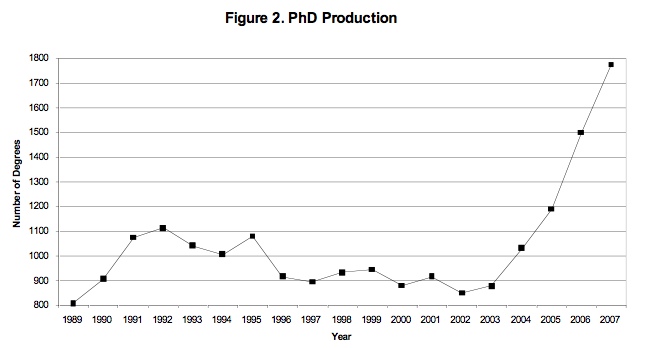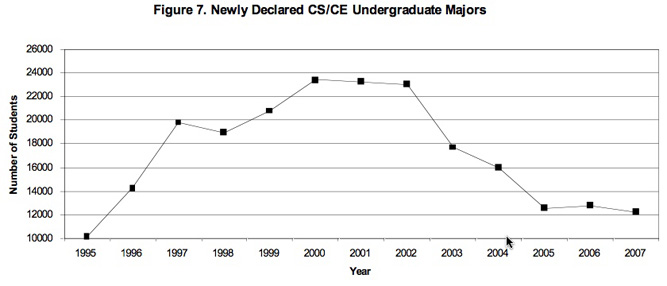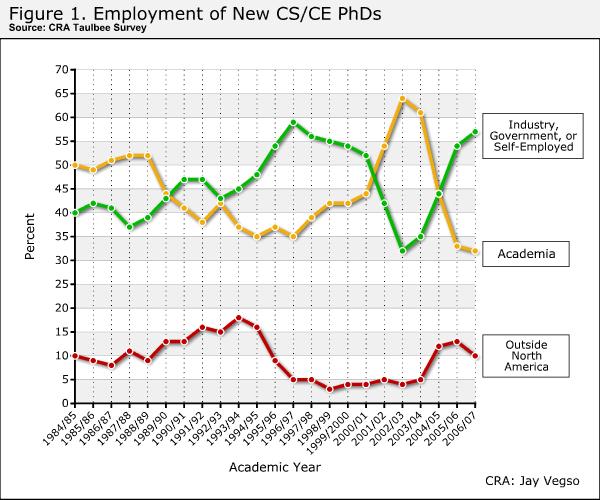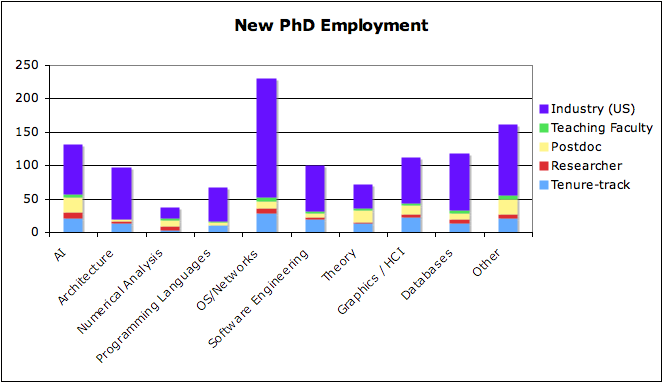The CRA (Computing Research Association) runs the Taulbee Survey which studies trends in computer science education and employment. There are some pretty interesting numbers in the reports which came out earlier this year.
BS and PhD Production
I was first surprised to see just how many PhDs are being awarded. Almost 1800 new PhDs were produced last year, and the growth compared to the 90s and early 2000s is pretty staggering. The report suggests that the numbers will be even higher in the coming year, although the rate of increase is expected to drop.

On the other hand, undergraduate CS enrollment is doing terribly right now. I’d blame this partly on bad stereotypes about computer science, but mainly on most undergraduates having no real logical basis for why they choose a major. Sadly, I’m not sure if that will ever change.
PhD Employment
Next let’s look at where all of these PhDs are going after they graduate. Industry took 52% of the new graduates, while about 33% went to academic departments. Of the academics, more than three quarters went to PhD granting departments.
The trends for employment type are fairly steady, except immediately following the dot com bust around 2001. I suspect that the current financial woes in this country will again lead to an increase headed towards academia, although if the depression/recession is widespread enough it may impact academic funding as well. Hopefully universities will do well since a lot more people are going to suddenly want to go back to school or stay in grad school due to limited job options. On the other hand, my own department is not hiring anyone this year because of budget cuts, so it may take a while before the money appears to make this happen.
Of course CS is a wide field, and the subdivisions within it can act very differently, so we can dig down a step deeper to see the breakdown of new job types by area within CS. It is interesting to see here that OS/Networking (my own area) is by far the largest proportion of graduates. If you were to condense multiple groups into the three main areas in my department: Systems, AI, and Theory, then the systems group is by far the largest with 835 members, compared to 201 and 112 in AI and Theory (although an additional 627 are other fields like graphics or “unknown”). Note: these numbers are for grads who got jobs in North America only.
Although OS/Networking is the biggest group, about 75% of its members go to industry, compared to 55% of AI and 50% of Theory graduates. I’m not too surprised by this since Systems is of course a more practical field that can be more readily applied to industry goals. However, it is interesting that on an absolute scale, there were more AI than OS grads going into academia (57 vs 51) even though there are almost twice as many OS grads in total. Hopefully that means that if I want to get a job in academia it will be easier since there are a lot of grad students in my field, but not many that are as interested in academic jobs.
What About the Money?
 So, will getting a PhD make you rich? I’m not sure about that yet, but here are a few of the salary numbers that I managed to dig up. The Taulbee survey includes information on starting faculty salaries. The tenure track median salary was $85,000. Non-tenure track researchers can expect $66K and postdocs around $47K. These are 9 month salaries, so the yearly numbers will be a bit higher (of course that means you have to write some grants to get someone to pay you for those other months). I haven’t been able to get a good sense of how this compares to industry salaries. This set of slides from CRA reports salaries in the $75 to $120K a year range for industrial research labs. I’m not sure how industrial job salaries increase over time, but the mean salary for full professors in CS departments was $130K for 9 months.
So, will getting a PhD make you rich? I’m not sure about that yet, but here are a few of the salary numbers that I managed to dig up. The Taulbee survey includes information on starting faculty salaries. The tenure track median salary was $85,000. Non-tenure track researchers can expect $66K and postdocs around $47K. These are 9 month salaries, so the yearly numbers will be a bit higher (of course that means you have to write some grants to get someone to pay you for those other months). I haven’t been able to get a good sense of how this compares to industry salaries. This set of slides from CRA reports salaries in the $75 to $120K a year range for industrial research labs. I’m not sure how industrial job salaries increase over time, but the mean salary for full professors in CS departments was $130K for 9 months.
So fiscally speaking, it sounds like you can get a pretty good job with a PhD (even ignoring non monetary benefits like increased autonomy and job stability). On the other hand you have to first survive 6 or more years of grad school without starving. I did some comparisons of expected retirement savings comparing the scenario where I get an academic job at age 28 versus having immediately gotten a lower paying job out of college. Unfortunately, the results were inconclusive — one site said that Professor Tim would run out of cash at age 99 and starve to death while another expected him to surpass his less educated counterpart at age 42 and go on to live off of investment interest for all of eternity. I guess only time will tell.
Disclaimer: Most of these figures have been lifted from the survey website, and I encourage you to go there to see their full results and analysis. I have tweaked a few of the images to try to make them more readable, and created the last image using their text data.


